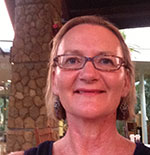"The flexibility of timing due to the entirely online nature of the program stood out to me. I could work on things when I had the time, which I think is a great feature for people who are generally working full time. I also liked the mix of discussion and individual assignments in the courses; getting to hear others’ opinions and experiences was very useful."
PHDA testimonials
- How did you learn about the program and what motivated you to enroll?
-
I was in Canada and the program seemed a perfect fit to my interests.
- Tell us about your course experience. What skills did you develop and which courses provided the greatest benefit to you?
-
I thoroughly enjoyed the courses, although sometimes I had trouble keeping up. Having said that, I found the lecturers very sympathetic to my needs. It was great to develop more understanding of the analysis of administrative datasets and in particular learning how to use geocoded data.
- How have you been able to (or how do you plan to) apply your new skills in your work/research?
-
I will use my skills to undertake some more specific analysis using linked data. In particular, I plan to undertake some mapping of hotspots where illicit drug use is most common. For my interests at this time I found longitudinal data analysis and geocoding the most helpful. This is because with increasing use of multiple drugs it is important to determine where outbreaks occur and be able to establish cohorts of people who use these substances and then follow over time determining predictors of change.
- What do you think were the strengths of this program? Please provide examples.
-
The flexibility of the modules was very good and I appreciated learning from other students when there was something I couldn’t solve. For example when I couldn’t run a particular program, I could easily get assistance with this. Having access to previous assignments on the same topics made things much easier as well.
- Would you recommend this program to others? If so, what recommendations/suggestions would you give those interested in applying to this program?
-
Yes, I would recommend this program and regularly circulate information about the courses as updates come to me.
- Any additional comments you would like to add?
-
It was a really great experience and I learnt a great many new things so thank you!
- How did you learn about the program and what motivated you to enroll?
-
I learned of the Professional Specialization Certificate in Pop Health Data Analysis through a couple of sources, including the Canadian Evaluation Society and the BC Centre for Excellence in Women’s Health. One of the program postings included information about a CIHR funding opportunity for eligible students. After looking into the program details as well as the CIHR funding, I decided that it would be a good program for my professional development. I have a master’s in Public Health, and while taking the program, I worked for a non-profit social and health policy research organization where I could apply the skills I learned. One of the areas which I felt I could build on was the use of quantitative and administrative health data; this program was a perfect fit.
- Tell us about your course experience. What skills did you develop and which courses provided the greatest benefit to you?
-
The courses which provided the greatest benefit were also the ones where I developed my skills the most. Population Health and GIS (PHDA 03) and Epidemiological Statistics (PHDA 02) were both challenging courses but very informative. Prior to taking the program, I had zero knowledge or experience with GIS. The PHDA 03 course involved a steep learning curve and required a significant amount of time investment. However, by the end of the course, I found I had a basic understanding of how public health and geography intersect and the benefits of GIS applications to public health issues. I also have a basic understanding and use of the GIS software program ArcGIS, which I found very valuable. In addition, the PHDA 02 course was a great refresher for advanced statistics using sample data sets and applied examples.
- How have you been able to (or how do you plan to) apply your new skills in your work/research?
-
At the time of starting the certificate program, I had intended to apply the skills and knowledge I learned to my work on an evaluation of a health program in BC. However, I have recently re-located to Nova Scotia with my family. While I am not currently using the skills and knowledge I gained, I expect that I will use them in my future work.
- What do you think were the strengths of this program? Please provide examples.
-
For a program that is delivered completely online, each course was organized and delivered very well. Most of the instructors were very quick with their replies to questions from students. All of the courses used practical examples to explain the material which I found really helpful for understanding how to apply the concepts in practice. In the Working with Administrative Data (PHDA 01) course, the instructors were extremely helpful, and I found the 15 minute phone meeting near the start of the course really nice. It was so much easier to go through several questions/concerns at once on the phone with person rather than through several online posts.
The PHDA 03 course involved a lot of work, but was structured in a way that it was easy to work through each module. The instructor provided step by step instructions for each module about how to use ArcGIS. By the end of the course, I went from someone with zero experience in GIS to someone who can understand how to interpret maps, basic tools in ArcGIS, and how to apply GIS to public health issues.
I went into the program with few expectations, and wasn’t sure how challenging the courses would be. I was initially surprised, but then thankful, that all of the courses were very comparable to graduate level studies. Even though each course required a bit more work and time commitment than I initially planned for, I felt each of them challenged me and taught me new concepts and skills that I can take away and use immediately in my work.
- Would you recommend this program to others? If so, what recommendations/suggestions would you give those interested in applying to this program?
-
I would recommend this program to anyone working in the public health field and handling or interpreting data that is looking to update or acquire new skills. The students in my classes had various backgrounds, some with prior education or experience in public health, and some with limited education or experience but who are now working in the field. Even with the various student backgrounds, I felt the courses were appropriate for anyone at an introductory or intermediate level. The courses were of high quality and good value. For anyone planning to enroll in the program, while working full time, I would recommend taking only one course per semester. On average, I spent 10-12 hours each week on course readings, activities, online forums and assignments each week. The CIHR funding was also a significant factor in my decision to enroll and a great benefit to me. Without this funding I would have likely chosen a few of the courses I felt I needed and completed them over a longer period of time.
Overall I felt taking the courses and the certificate were worth it and I am confident that I will be able to use the skills and knowledge I learned in my work in the future.
- Any additional comments you would like to add?
-
Overall I enjoyed the courses I took (PHDA01, 02, 03 and 06). For the most part the instructors structured the course work and modules well.
- How did you learn about the program and what motivated you to enroll?
-
I Iearned about the program through the UVic Continuing Studies website while I was an under grad at UVic. I later worked for the Provincial government. As a government employee I was eligible to get financial support for professional development training. The PHDA program was a good fit for the analytic skills I needed. I already had some experience working with Administrative data.
- Tell us about your course experience. What skills did you develop and which courses provided the greatest benefit to you?
-
I found the courses I took, PHDA 01 Working with Administrative Data, PHDA 02 Epidemiological Statistics, PHDA 03 Population Health and GIS and PHDA 04 Spatial Epidemiology and Outbreak Detection, all followed in suite to cement my knowledge and skills in methods and research design. The first two courses, PHDA 01 and PHDA 02 were more of a review/refresher for me from my previous academic and work experience. The PHDA 01 course included learning SAS skills and creating your own study. The PHDA 02 course focused more on practical analytic work and less on statistical theory. My favourite course was PHDA 04. It applied all the background/analytic skills I had learned within previous PHDA courses and taught me new geospatial skills.
- How have you been able to (or how do you plan to) apply your new skills in your work/research?
-
My new skills would have proven useful in my previous role as a policy analyst for the provincial government, however I have switched positions. I intended on using my SAS skills and geospatial analysis tools to analyze the MSP data I had access to.
My new job is as a strategy analyst and the certificate has provided me knowledge about the potential use of administrative data to inform decision making. In completing this course, I have added another domain of knowledge which I can consider when developing strategic plans related to IM/IT.
- What do you think were the strengths of this program? Please provide examples.
-
One of the greatest strengths of the program is the access to the Secure Research Training Lab. It holds practical, well written, easy to follow lab activities in data analytics and a very useful de-identified BC Heath Dataset as well as other health related training datasets for applied learning. This provided an excellent learning environment for professional development training in data analytics.
- Would you recommend this program to others? If so, what recommendations/suggestions would you give those interested in applying to this program?
-
Yes, I would definitely recommend this program to others. For those just starting the program within the PHDA 01 course, I would recommend that they work carefully through the SAS components and try to keep their project work simple. It is also best to take one course at a time if you are working or taking full time studies.
"I would recommend this program to anyone working in the public health field that is handling or interpreting data and looking to update or acquire new skills. The courses were of high quality, good value and appropriate for anyone at the introductory or intermediate level.
For a program that is delivered completely online, each course was organized and delivered very well. Most of the instructors were very quick with their replies to questions from students. All of the courses used practical examples to explain the material which I found really helpful for understanding how to apply the concepts in practice. Even though the courses required a bit more work and time commitment than I initially planned for, I felt each of them challenged me and taught me new concepts and skills that I can take away and use immediately in my work."
Pagination
Copyright 2024· All rights reserved

